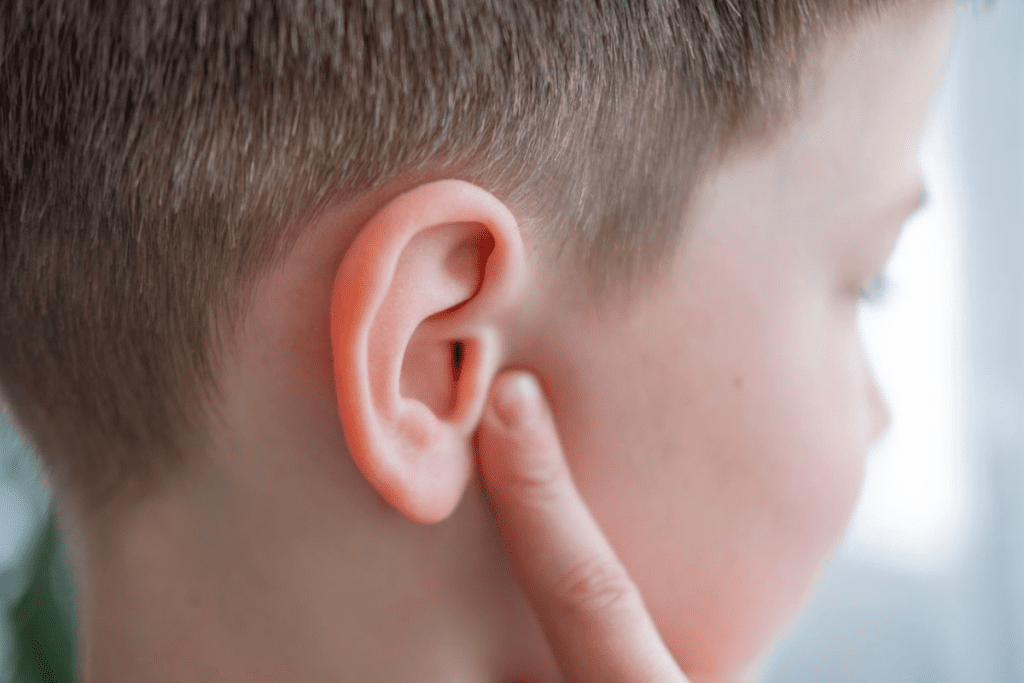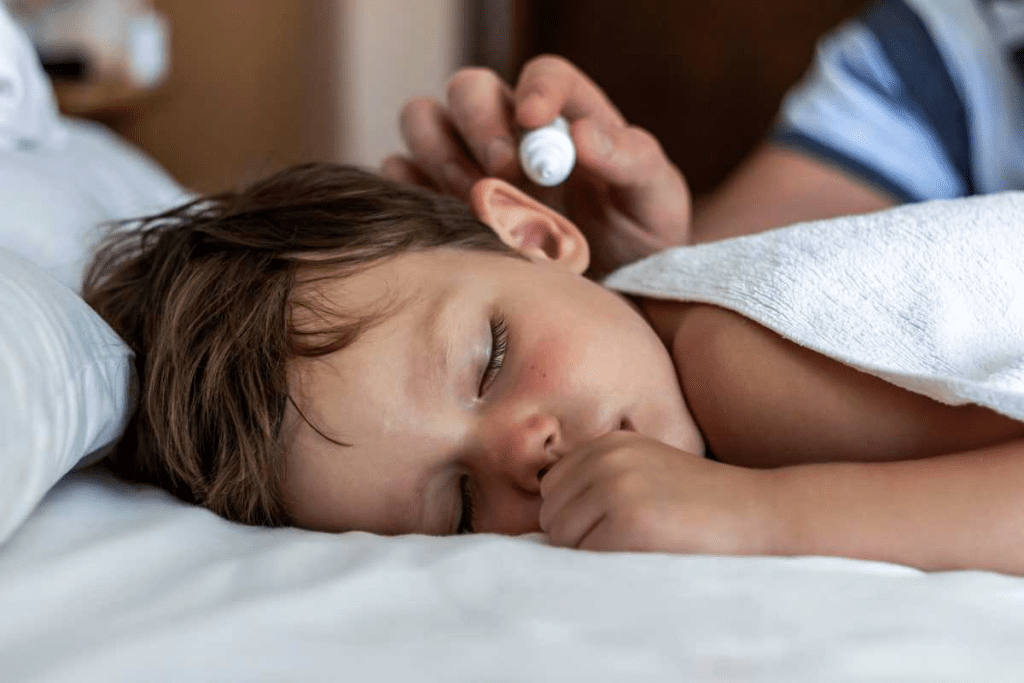Last Updated on November 14, 2025 by

COVID-19 can cause ear problems like fullness, hearing loss, and tinnitus. Studies show that ‘COVID ear’ can last a long time. It affects people’s lives even after they’ve recovered. Learn how to unclog ears and how long COVID-related ear issues can last for effective relief. so lets check it out now.
The time these symptoms last can differ. It’s key to know how common ear issues are in COVID-19 patients. Clogged ear often happens because of blocked eustachian tubes.
This article will look into how long COVID ear symptoms last and how to treat them. It aims to help those dealing with these issues.
COVID-19 has been linked to ear problems, known as ‘COVID ear.’ These issues can make life harder for those getting over the virus.

Many people feel their ears are full or under pressure. It’s like their ears are blocked, similar to when you have a cold or are on a plane. Relieving ear pressure is a big concern for them.
Some folks say they can’t hear as well or hear sounds muffled after COVID-19. This can be a small problem or a big one. Finding out why is key to fixing it.
Tinnitus is when you hear ringing or other sounds in your ears without anything being there. Other weird sounds or being too sensitive to certain sounds can also happen.
These symptoms show how COVID-19 can affect our hearing. We need to learn more and find better ways to treat these issues.
COVID-19 has had a big impact on our ears. Studies show that many people have ear problems after getting COVID-19. This is a big concern for health experts.

Research has given us numbers on ear symptoms from COVID-19. 3.1% of people with COVID-19 have hearing loss. Also, 4.5% get tinnitus. And, 12.2% experience dizziness, which can be a sign of inner ear problems.
These numbers show we need to learn more about how COVID-19 affects our ears.
Many ear symptoms from COVID-19 are not reported. This is because other symptoms are seen as more serious. Also, not everyone knows about ear problems from COVID-19. And, how bad the symptoms are can vary a lot.
Doctors should ask about ear symptoms in COVID-19 patients. This helps make sure they get the right care.
Some people are more likely to have ear problems from COVID-19. The severity of the COVID-19 infection, health conditions before getting sick, and age play a role. Knowing these risk factors helps doctors watch for ear problems in certain patients.
Knowing how long a clogged ear from COVID lasts is key for recovery. The time it takes for ear symptoms to go away can vary a lot. It’s important to look at the different patterns seen in patients.
Often, a clogged ear symptom clears up within 2-4 weeks after COVID-19. This is seen in mild to moderate cases. During this time, symptoms can change, with some days being better than others.
For some, the clogged ear symptom lasts longer, usually 1 to 3 months. This can be worrying, but it’s important to remember it can clear up by itself. The severity of the infection and health conditions can affect how long it lasts.
In some cases, the symptom can last more than 3 months. These long-term cases might need medical help to find out why the symptom won’t go away. It’s vital for those with long-lasting symptoms to see a doctor for advice and care.
The different times it takes for ear symptoms to go away show the need for tailored medical care. By understanding these patterns, both patients and doctors can work together to manage symptoms and find any underlying issues.
COVID-19 can cause ear problems, like feeling like your ears are blocked. This happens because of how your body reacts to the virus. Knowing why it happens helps fix the issue.
The body’s fight against COVID-19 can make your ears feel full or blocked. This is because the inflammation can mess with the Eustachian tube. This tube is key for keeping air pressure in your ear balanced.
After getting COVID, many people face Eustachian tube problems. This tube helps your ears feel normal. But if it’s not working right, you might feel like your ears are clogged.
Some people keep having ear issues because of COVID’s effect on their nervous system. This can cause long-lasting ear problems. It’s important to understand this to get better.
In short, clogged ears after COVID are due to inflammation, Eustachian tube issues, and nervous system problems. Fixing these problems is key to feeling better and keeping your ears healthy.
If you’re feeling ear fullness or pressure after COVID-19, you’re not alone. There are ways to unclog your ears. Knowing the treatments can help you feel better.
Medical help can solve ear congestion from COVID-19. Seeing a healthcare professional is the first step. They can suggest treatments based on your symptoms.
Some treatments include:
In some cases, a healthcare provider might perform a procedure to relieve the pressure. This could be myringotomy, where a small incision is made in the eardrum to drain fluid or relieve pressure.
There are also home remedies for ear congestion. Simple actions like swallowing, yawning, or performing the Valsalva maneuver can help open the Eustachian tube and relieve pressure.
Other home remedies include:
As one healthcare professional noted,
“Simple actions like yawning or the Toynbee maneuver can be very effective in relieving ear pressure.”
If ear pressure persists, it’s important to seek further medical evaluation. Persistent ear congestion could indicate an underlying issue that needs professional attention.
Further diagnostic tests might be required to determine the cause of the ongoing discomfort. These could include hearing tests or imaging studies to assess the middle ear’s condition.
Understanding the cause of persistent ear pressure is key to finding an effective treatment. With the right approach, it’s possible to find relief and restore comfort.
The time COVID ear symptoms last depends on many factors. Knowing these can help manage and shorten ear symptoms.
The first COVID-19 infection’s severity affects ear symptom duration. Research shows severe infections lead to longer ear symptoms. This is because the body’s strong inflammatory response can harm the ear.
Key factors related to the severity of infection include:
Pre-existing health issues, like diabetes, can extend COVID ear symptoms. Diabetes can slow down recovery, causing symptoms to last longer.
Age and demographic factors are key in COVID-19 symptom duration. Older adults and some groups may face longer symptoms due to weaker immune systems and health issues.
Vaccination status can influence COVID-19 symptom duration. Vaccines can lessen COVID-19’s severity, which may shorten ear symptoms. While studies are ongoing, vaccination likely helps reduce ear symptom severity and duration.
It’s essential to consult healthcare professionals for personalized advice on managing COVID-19 ear symptoms.
If ear symptoms last after COVID-19, getting medical help is key. These symptoms can really affect your life. So, acting fast is important.
If your ear is blocked for days, knowing when to see a doctor is important. If symptoms last more than a few weeks or cause severe pain, hearing loss, or dizziness, you need to see a doctor. Getting help early can stop problems and help you feel better.
A doctor said, “Don’t ignore ear symptoms after COVID-19. Seeing a doctor is the first step to getting better.”
“The key to managing persistent ear symptoms lies in understanding the underlying cause and adopting a tailored treatment approach.”
According to an ENT Specialist
Tests are used to check for COVID-related hearing problems. These include:
Treatment for ear symptoms depends on how long they last and why. Options might be:
Managing ear symptoms after COVID needs a team effort. This team includes ENT specialists, audiologists, and primary care doctors. Working together, they make sure you get the best care for your needs.
With a team approach, doctors can create treatment plans that fit each patient’s needs. This helps improve recovery and quality of life.
It’s important to know what to expect when recovering from COVID ear. Most people see their symptoms go away in a few weeks to months. But, how long it takes can vary a lot.
Things like how bad your COVID-19 was, any health issues you already have, and your age can affect how long your ear symptoms last. If your symptoms don’t get better or get worse, you should see a doctor. They can help figure out what’s going on and find a way to treat it.
Most people do get better from COVID ear, but some might have symptoms that last longer. Scientists are working hard to learn more about this. Doctors are also finding new ways to help people who have symptoms that don’t go away.
COVID ear symptoms can last from a few weeks to months. It varies for everyone.
Symptoms include ear fullness, pressure, hearing loss, and muffled sounds. Tinnitus and other hearing issues are also common.
About 3.1% of COVID-19 patients have hearing loss. 4.5% have tinnitus, and 12.2% feel dizzy.
Ears may feel clogged due to inflammation and Eustachian tube issues. Neurological factors also play a role.
Try the Toynbee maneuver, yawning, or nasal decongestants. Medical help may also be needed.
The severity of COVID-19, diabetes, age, and demographics affect symptom duration.
If symptoms don’t improve or get worse, see a healthcare professional. They can evaluate and treat you.
Tests include audiological evaluations and tympanometry. They help determine hearing loss and other issues.
Treatment depends on symptom duration. It may include medical interventions, hearing rehabilitation, or multidisciplinary care.
Research is ongoing. It’s not clear if vaccination status impacts symptom duration and severity.
Manage symptoms with medical treatments, lifestyle changes, and tailored care plans. Each person’s needs are different.
Clogged ears may be due to Eustachian tube issues, inflammation, or other factors. Medical evaluation is needed.
Subscribe to our e-newsletter to stay informed about the latest innovations in the world of health and exclusive offers!